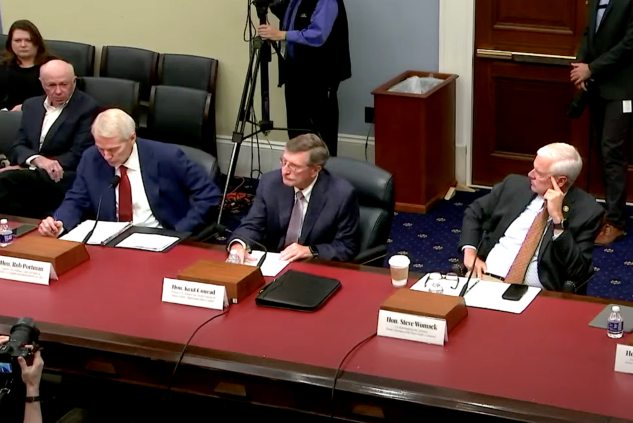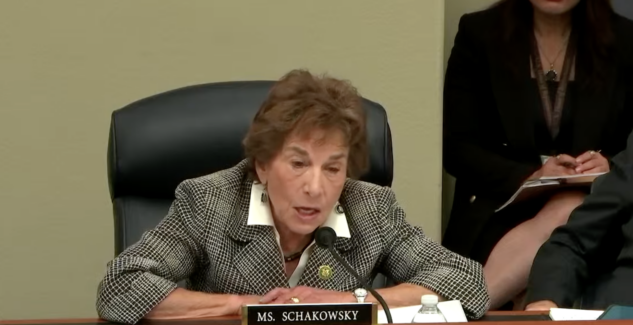![]()

NCPSSM president Max Richtman offered testimony today to the U.S. House Budget Committee, warning that the creation of a fiscal commission to address the federal debt could jeopardize Social Security and Medicare benefits.
“As Congress grapples with the implications of a federal debt currently topping $33 trillion, pressure by fiscal conservatives inevitably turns to finding ‘savings’ in Social Security, even though this critical social insurance program for America’s workers does not contribute a single penny to the national debt,” said Richtman in his testimony.
As Laura Haltzel of the Century Foundation points out, “The simple fact is, Social Security is self-financed… and has accumulated massive surpluses… to pay current and future benefits. Further, it simply cannot add to the government’s publicly held debt, as it has no borrowing authority.” (Medicare Part A is also self-financed by workers’ payroll contributions.)
That has not stopped fiscal conservatives from coming after Social Security and Medicare in the name of debt reduction. Several of the Republican budget committee members at today’s hearing, including Rep. Steve Womack (R-AR), conflated Americans’ earned benefits with the federal debt, claiming that “fiscal dysfunction” in Washington is linked to Social Security and Medicare.
In point of fact, according to the Center on Budget and Policy Priorities, the number one driver of the debt is “tax expenditures” — giveaways to the wealthy and profitable corporations that forsake revenue that could help reduce red ink. Of course, fiscal conservatives seldom mention the Trump/GOP tax cuts, which swelled the debt by some $2 trillion. Many congressional Republicans want to make those tax cuts permanent.
Democrats in today’s hearing pointed out that there is no need for a fiscal commission, arguing that Congress should deliberate and pass legislation under “regular order” rather than relegate such important issues to an unelected panel. “When we have a functioning Congress, we have the tools to deal with all of this,” said Rep. Jan Schakowsky (D-IL), who noted that fiscal commissions “always seem to target Social Security and Medicare.”
One Republican on the committee seemed to agree. Rep. Tom McClintock (R-CA) said that the “ultimate bipartisan commission is called Congress” — and urged members not to “pass the buck” to a fiscal commission.

“Fiscal commissions always seem to target Social Security & Medicare,” says Rep. Jan Schakowsky
Opponents, including NCPSSM, have argued that such commissions traditionally emphasize cuts to social insurance programs while ignoring revenue-side solutions. “If revenue is not on the table, it is a commission to cut Social Security and Medicare,” said Rep. Lloyd Doggett (D-TX) at the hearing.
“Commissions are designed to squeeze every possible dollar of savings out of Social Security without consideration for the adequacy of benefits during their deliberations. They are intended as a vehicle for enacting deep cuts to Social Security and Medicare that could never pass Congress on their own because of their unpopularity with the voting public.” – Max Ricthman, NCPSSM President, Congressional testimony, 10/19/23
Advocates for a fiscal commission point to the Greenspan Commission, appointed by President Ronald Reagan and the Congress in 1981 to make recommendations on the short-term financing crisis that Social Security faced at that time, as a model for a new one. But the socioeconomic and political landscape has changed drastically in the past 42 years — and the Greenspan Commission was far from an unmitigated success.
“Robert Ball, a major player in the Greenspan Commission, famously wrote, ‘Nothing should obscure the fact that (it) was not an example of a successful bipartisan commission. The commission itself stalled after reaching agreement on the size of the problem that needed to be addressed. As a commission, that was as far as it got.’” – Laura Haltzel, Century Foundation, 10/18/23
Former House Budget Committee chairman John Yarmouth (D-KY) testified that “unelected commissions” do not have “superhuman powers.” And, he added, “They do not have souls.”
Read NCPSSM’s Viewpoint about the Greenspan Commission here.


